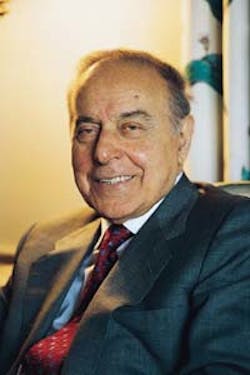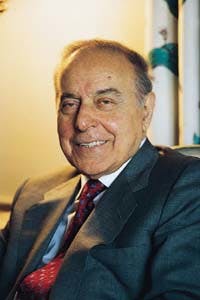Azerbaijan's Aliyev Pursuing Fine Political Balance In Advancing Caspian Affairs Globally
Richard Wheatley
Associate Managing Editor-News
Some call Heydar Aliyev an enigma, the same way doing business in the former Soviet Union often was viewed by western businessmen after the fall of the U.S.S.R. in 1991.
Despite the many analogies, the affable exterior of the 74-year-old President of the Republic of Azerbaijan clearly shows an inner pragmatism of having once been a general in the dreaded KGB and an astute member of the Soviet Politburo before his departure, or ouster-depending on the source and the spin-and his subsequent rise to power as president in 1993.
Aliyev was in Houston Aug. 2 for cordial meetings with oil industry officials and selected members of the news media, including the Oil & Gas Journal, during his U.S. visit Houston stopover.
Coordinated by the Greater Houston Partnership, a Houston Chamber of Commerce/economic development umbrella group, it was an indication of what is on the president's mind in terms of his U.S. relations.
Azerbaijan's role, resources
Now, 6 years after the implosion of the Soviet Union, as the head of a littoral Caspian state-perhaps the one that will set the major tone for the region's oil/economic development for years to come-Aliyev clearly understands his new role as the capitalistic leader of the most populous of the trans-Caucasian republics, which has been developing oil since the mid-19th century.
"Before my arrival in Washington, we had already signed six oil contracts; in Washington, we signed three more new oil contracts. Thus, we have now nine big oil contracts," Aliyev said.
In addition, Azerbaijan signed a deal with Amoco Corp., "granting them an exclusive right to develop one of the fields" (see related story, p. 24).
Safety of oil supplies soon to be moved via the northern route early oil pipeline has been taken a step further after a three-way agreement was signed by Chechnya, Russia, and Azerbaijan, Aliyev said.
"Now it is safe, because last month in Baku we signed an agreement... about the pipeline (segment) through Chechnya. I think there are no more impediments in this direction anymore."
Rosneft situation
Rosneft's recent withdrawal from Kyapaz field development is puzzling, Aliyev indicated.
Part of the field is in the Turkmenistan sector of the Caspian Sea; part of it is in the Azerbaijan sector, Aliyev said.
He said an agreement was signed covering joint development, but later, "Turkmenistan was not satisfied with this. We believe in the sectoral division of the seaellipsehalf of it (Kyapaz) belongs to Turkmenistan, and half of it belongs to Azerbaijan."
On the question of whether the Caspian is a sea under international law or a lake continues to be a point of contention over which bordering republic or state will have rights to resources in certain areas.
Aliyev said, "We still need to investigate whether it's a lake or a sea."
Spotlight could be brighter
Azerbaijan's spotlight on the world's stage is dimmed by its one-time conflict with Armenia and by an Armenian lobbying bloc in the U.S., alleging acts of repression, aggression, human rights violations, and the blockading of the enclave of Nagorno-Karabakh by Azerbaijan. For now, that has interdicted potential U.S. aid and trade benefits.
Aliyev said he's hopeful there can be a peaceful solution to the one-time military conflict over Nagorno-Karabakh. "We want to achieve a comprehensive peace," he said.
Aliyev said he discussed the issue with President Clinton and other officials while in Washington. Aliyev said Clinton assured him that he and other U.S. officials "will be involved and work hard to help us to achieve a peaceful solution to this conflict...in 1997."
Aliyev favors total repeal of Section 907 of the Freedom Support Act, blocking aid to Azerbaijan.
"I had very detailed discussions in Congress about it-both in the House of Representatives and in the Senate-including with Speaker Gingrich.
"I discussed it with Mr. Clinton in detail. In these discussions, they promised me they will make efforts to repeal 907, and they will try to ensure it. It should be repealed."
International relations
Aliyev said he is pursuing a path of normal relations with Russia and Iran. "Russia is a great country...our economy is closely linked, and we want to develop economic relations with Russia. But these relations should not violate the independence of Azerbaijan. These relations should be equal...based on non-interference...."
A new president, Mohammed Khatami, last week succeeded Hashemi Rafsanjani in Iran.
"If the new president will make a new initiative in a positive direction to advance Iran and Azerbaijan relations, we will support that."
President Heydar A. Aliyev
Copyright 1997 Oil & Gas Journal. All Rights Reserved.

